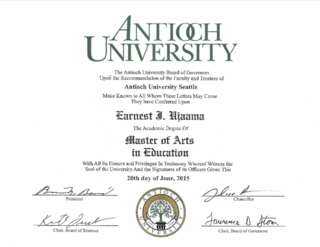
Albert Einstein was a German-born theoretical physicist who is widely held to be one of the greatest and most influential scientists of all time. Best known for developing the theory of relativity, Einstein also made important contributions to quantum mechanics, and was thus a central figure in the revolutionary reshaping of the scientific understanding of nature that modern physics accomplished in the first decades of the twentieth century. His mass–energy equivalence formula E = mc2, which arises from relativity theory, has been called "the world's most famous equation". He received the 1921 Nobel Prize in Physics "for his services to theoretical physics, and especially for his discovery of the law of the photoelectric effect", a pivotal step in the development of quantum theory. His work is also known for its influence on the philosophy of science. In a 1999 poll of 130 leading physicists worldwide by the British journal Physics World, Einstein was ranked the greatest physicist of all time. His intellectual achievements and originality have made the word Einstein broadly synonymous with genius.

Basketball is a team sport in which two teams, most commonly of five players each, opposing one another on a rectangular court, compete with the primary objective of shooting a basketball through the defender's hoop, while preventing the opposing team from shooting through their own hoop. A field goal is worth two points, unless made from behind the three-point line, when it is worth three. After a foul, timed play stops and the player fouled or designated to shoot a technical foul is given one, two or three one-point free throws. The team with the most points at the end of the game wins, but if regulation play expires with the score tied, an additional period of play (overtime) is mandated.

A college is an educational institution or a constituent part of one. A college may be a degree-awarding tertiary educational institution, a part of a collegiate or federal university, an institution offering vocational education, a further education institution, or a secondary school.

India, officially the Republic of India, is a country in South Asia. It is the seventh-largest country by area; the most populous country as of June 2023; and from the time of its independence in 1947, the world's most populous democracy. Bounded by the Indian Ocean on the south, the Arabian Sea on the southwest, and the Bay of Bengal on the southeast, it shares land borders with Pakistan to the west; China, Nepal, and Bhutan to the north; and Bangladesh and Myanmar to the east. In the Indian Ocean, India is in the vicinity of Sri Lanka and the Maldives; its Andaman and Nicobar Islands share a maritime border with Thailand, Myanmar, and Indonesia.

The Ivy League is an American collegiate athletic conference, comprising eight private research universities in the Northeastern United States. The term Ivy League is typically used outside sports to refer to the eight schools as a group of elite colleges with connotations of academic excellence, selectivity in admissions, and social elitism. Its members are Brown University, Columbia University, Cornell University, Dartmouth College, Harvard University, Princeton University, University of Pennsylvania, and Yale University. The conference headquarters are in Princeton, New Jersey.

Latin is a classical language belonging to the Italic branch of the Indo-European languages. Considered a dead language, Latin was originally spoken in Latium, the lower Tiber area around Rome. Through the expansion of the Roman Republic it became the dominant language in the Italian Peninsula and subsequently throughout the Roman Empire. Even after the fall of Western Rome, Latin remained the common language of international communication, science, scholarship and academia in Europe until well into the 18th century, when regional vernaculars supplanted it in common academic and political usage. For most of the time it was used, it would be considered a dead language in the modern linguistic definition; that is, it lacked native speakers, despite being used extensively and actively.

Muhammad was an Arab religious, social, and political leader and the founder of Islam. According to Islamic doctrine, he was a prophet divinely inspired to preach and confirm the monotheistic teachings of Adam, Abraham, Moses, Jesus, and other prophets. He is believed to be the Seal of the Prophets within Islam, with the Quran as well as his teachings and practices forming the basis for Islamic religious belief.
1 is a number representing a single or the only entity. 1 is also a numerical digit and represents a single unit of counting or measurement. For example, a line segment of unit length is a line segment of length 1. In conventions of sign where zero is considered neither positive nor negative, 1 is the first and smallest positive integer. It is also sometimes considered the first of the infinite sequence of natural numbers, followed by 2, although by other definitions 1 is the second natural number, following 0.

Sex is the trait that determines whether a sexually reproducing organism produces male or female gametes. During sexual reproduction, a male and a female gamete fuse to form a zygote, which develops into an offspring that inherits traits from each parent. By convention, organisms that produce smaller, more mobile gametes are called male, while organisms that produce produce larger, non-mobile gametes are called female. An organism that produces both types of gamete is hermaphrodite.

Tokyo, officially the Tokyo Metropolis, is the capital of Japan and one of the most populous cities in the world with a population of over 14 million residents as of 2023. The Tokyo metropolitan area, which includes Tokyo and nearby prefectures, is the world's most-populous metropolitan area, with 40.8 million residents as of 2023, and is the second-largest metropolitan economy in the world after New York, with a 2022 gross metropolitan product estimated at US$2.08 trillion.

William Shakespeare was an English playwright, poet and actor. He is widely regarded as the greatest writer in the English language and the world's pre-eminent dramatist. He is often called England's national poet and the "Bard of Avon". His extant works, including collaborations, consist of some 39 plays, 154 sonnets, three long narrative poems, and a few other verses, some of uncertain authorship. His plays have been translated into every major living language and are performed more often than those of any other playwright. Shakespeare remains arguably the most influential writer in the English language, and his works continue to be studied and reinterpreted.

World War II or the Second World War was a global conflict that lasted from 1939 to 1945. The vast majority of the world's countries, including all the great powers, fought as part of two opposing military alliances: the Allies and the Axis. Many participating countries invested all available economic, industrial, and scientific capabilities into this total war, blurring the distinction between civilian and military resources. Aircraft played a major role, enabling the strategic bombing of population centres and delivery of the only two nuclear weapons ever used in war. It was by far the deadliest conflict in history, resulting in 70–85 million fatalities. Millions died due to genocides, including the Holocaust, as well as starvation, massacres, and disease. In the wake of Axis defeat, Germany, Austria, and Japan were occupied, and war crime tribunals were conducted against German and Japanese leaders.

The Big Ten Conference is the oldest Division I collegiate athletic conference in the United States. Founded as the Intercollegiate Conference of Faculty Representatives in 1896, it predates the founding of its regulating organization, the NCAA. It is based in the Chicago area in Rosemont, Illinois. For many decades the conference consisted of 10 prominent universities, which accounts for its name. As of 2014, it consists of 14 member institutions and 2 affiliate institutions, with 4 new member institutions scheduled to join in 2024. The conference competes in the NCAA Division I and its football teams compete in the Football Bowl Subdivision (FBS), formerly known as Division I-A, the highest level of NCAA competition in that sport.
A bachelor's degree or baccalaureate is an undergraduate degree awarded by colleges and universities upon completion of a course of study lasting three to six years. The two most common bachelor's degrees are the Bachelor of Arts (BA) and the Bachelor of Science. In some institutions and educational systems, certain bachelor's degrees can only be taken as graduate or postgraduate educations after a first degree has been completed, although more commonly the successful completion of a bachelor's degree is a prerequisite for further courses such as a master's or a doctorate.

Undergraduate education is education conducted after secondary education and before postgraduate education, usually in a college or university. It typically includes all postsecondary programs up to the level of a bachelor's degree. For example, in the United States, a student pursuing an associate or bachelor's degree is known as an undergraduate student while a student pursuing a master's or doctoral degree is a graduate student. Upon completion of courses and other requirements of an undergraduate program, the student would earn the corresponding degree. In some other educational systems, undergraduate education is postsecondary education up to and including the level of a master's degree; this is the case for some science courses in Britain and some medicine courses in Europe.

A Master of Science is a master's degree. In contrast to the Master of Arts degree, the Master of Science degree is typically granted for studies in sciences, engineering and medicine and is usually for programs that are more focused on scientific and mathematical subjects; however, different universities have different conventions and may also offer the degree for fields typically considered within the humanities and social sciences. While it ultimately depends upon the specific program, earning a Master of Science degree typically includes writing a thesis.
Doctor of Medicine is a medical degree, the meaning of which varies between different jurisdictions. In the United States, and some other countries, the M.D. denotes a professional degree. This generally arose because many in 18th-century medical professions trained in Scotland, which used the M.D. degree nomenclature. In England, however, Bachelor of Medicine, Bachelor of Surgery (M.B.B.S.) was used and eventually in the 19th century became the standard in Scotland too. Thus, in the United Kingdom, Ireland and other countries, the M.D. is a research doctorate, honorary doctorate or applied clinical degree restricted to those who already hold a professional degree (Bachelor's/Master's/Doctoral) in medicine. In those countries, the equivalent professional degree to the North American, and some others' usage of M.D. is still typically titled Bachelor of Medicine, Bachelor of Surgery.

A Master of Arts is the holder of a master's degree awarded by universities in many countries. The degree is usually contrasted with that of Master of Science. Those admitted to the degree have typically studied subjects within the scope of the humanities and social sciences, such as history, literature, languages, linguistics, public administration, political science, communication studies, law or diplomacy; however, different universities have different conventions and may also offer the degree for fields typically considered within the natural sciences and mathematics. The degree can be conferred in respect of completing courses and passing examinations, research, or a combination of the two.
A Doctor of Philosophy is the most common degree at the highest academic level, awarded following a course of study and research. The degree is abbreviated PhD and sometimes, especially in the U.S., as Ph.D. It is derived from the Latin Philosophiae Doctor, pronounced as three separate letters. The abbreviation DPhil, from the English "Doctor of Philosophy", is used by a small number of Commonwealth universities, including Oxford in the UK.

The University of Cambridge is a public collegiate research university in Cambridge, England. Founded in 1209, the University of Cambridge is the world's third-oldest university in continuous operation. The university's founding followed the arrival of scholars who left the University of Oxford for Cambridge after a dispute with local townspeople. The two ancient English universities, although sometimes described as rivals, share many common features and are often jointly referred to as Oxbridge.